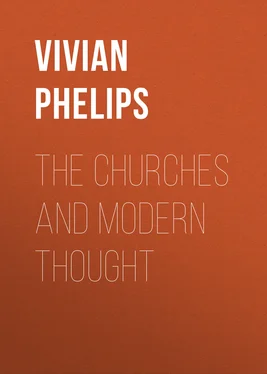Vivian Phelips - The Churches and Modern Thought
Здесь есть возможность читать онлайн «Vivian Phelips - The Churches and Modern Thought» — ознакомительный отрывок электронной книги совершенно бесплатно, а после прочтения отрывка купить полную версию. В некоторых случаях можно слушать аудио, скачать через торрент в формате fb2 и присутствует краткое содержание. Жанр: foreign_prose, foreign_religion, Философия, foreign_antique, на английском языке. Описание произведения, (предисловие) а так же отзывы посетителей доступны на портале библиотеки ЛибКат.
- Название:The Churches and Modern Thought
- Автор:
- Жанр:
- Год:неизвестен
- ISBN:нет данных
- Рейтинг книги:4 / 5. Голосов: 1
-
Избранное:Добавить в избранное
- Отзывы:
-
Ваша оценка:
- 80
- 1
- 2
- 3
- 4
- 5
The Churches and Modern Thought: краткое содержание, описание и аннотация
Предлагаем к чтению аннотацию, описание, краткое содержание или предисловие (зависит от того, что написал сам автор книги «The Churches and Modern Thought»). Если вы не нашли необходимую информацию о книге — напишите в комментариях, мы постараемся отыскать её.
The Churches and Modern Thought — читать онлайн ознакомительный отрывок
Ниже представлен текст книги, разбитый по страницам. Система сохранения места последней прочитанной страницы, позволяет с удобством читать онлайн бесплатно книгу «The Churches and Modern Thought», без необходимости каждый раз заново искать на чём Вы остановились. Поставьте закладку, и сможете в любой момент перейти на страницу, на которой закончили чтение.
Интервал:
Закладка:
So much is said about “scientific doubt” in these days that it is well to remember that doubts as to the truth of the Christian belief are not caused alone by purely scientific difficulties of faith. Carlyle refused to accept Darwin’s theories. His temperament was strongly inclined to a stern Puritanical piety, and his whole nature was antipathetic to science. Yet he did not think it possible that “educated honest men could profess much longer to believe in historical Christianity.” Renan, a profound scholar in Oriental languages, shows, in his famous work, The Life of Jesus , that, while keenly appreciative of all that was beautiful in the life and teaching of Jesus, he was forced, by his study of the Scriptures 19 19 Dr. W. Barry, in his Ernest Renan , is content to attribute the change mainly to Renan’s study of Kant. But such a theory is inconsistent with Renan’s own statement in his Reminiscences , where he expressly declares that questions of history, not metaphysics, shook his faith.
in the original, to the conclusion that the miraculous part of the narrative had no historical foundation. Leo Tolstoi, the helper of the helpless, whose voice is ever raised in the cause of universal love and peace, vainly sought an answer to religious doubts, and finally renounced Christian dogmas, building up a religion of his own. Numerous instances could be given showing that well-known and pious-minded thinkers have rejected Christianity on grounds other than scientific. And this diversity in the reasons for negation further tends to strengthen those suspicions regarding our faith which it is now the apologist’s task to dispel.
A significant circumstance is the far more tolerant attitude of the better-informed clergy towards the unbeliever. There still remain persons of the Dr. Torrey and the Rev. J. Morgan Gibbon 20 20 Author of a vituperative libel on agnostics, called Atheism and Faith .
type, ready to vilify the agnostic; but their number is rapidly on the decrease. The clergy, as a whole, are more tolerant now than many of the pious laity. Why is this? Is it not because they are beginning to appreciate the perplexities of faith, and to learn that agnostics as a body can be, and are, good men? Under certain conditions they themselves have severe wrestlings with the dictates of reason, and it is only by prayer 21 21 The psychical aspect of the belief of such persons is discussed in Chap. VI., § 5.
and occupying their minds in their work that they are able to dispel dark doubts. They will tell you that a faith such as theirs, and such as they hope you will attain after emergence from doubt, is a real faith, with which the faith of the ordinary person, accepting everything on trust, is not to be compared.
It is all very well to talk glibly, as so many do nowadays, of an age of tolerance. How can man be tolerant in matters concerning which God is alleged to have distinctly told us that He is not tolerant? It has often occurred to me that, were there such a person as the Devil, he must be much puzzled over the case of the high-minded agnostic, and more especially so if the latter conceived it his duty to propagate his views. In other words, if he were a militant agnostic—a Huxley or a Holyoake. For, on the one hand, if the Devil could persuade the agnostic to adopt religious conformity at the expense of self-respect, he would ruin the agnostic’s character, and so drag one more soul into perdition; but he would at the same time be rendering the whole Christian community a service by saving them from the dangerous advice of the agnostic. On the other hand, if Satan aided the agnostic in the line of conduct which he was at present conscientiously pursuing, the soul of the latter would slip from Satan’s grasp (for I presume there can be no punishment for honesty); but, as Anti-Christ, Satan would reap a grand harvest from the seeds of unbelief sown by the agnostic. And the purer and more unselfish the life of the agnostic, the more the latter would influence people to share his opinions. How does God view this perplexing situation? We are told from the pulpit nowadays, by the broader-minded parson, not only that agnostics may be good men, but that they “exhibit the very temper which Christ blesses.” 22 22 Canon Scott Holland, in a sermon preached in St. Paul’s Cathedral on the first Sunday after Epiphany, 1905. See also Appendix.
This curious truce between Believer and Unbeliever, each still holding fast to his belief or unbelief, only serves to demonstrate with added force that there is not, and cannot be, a reconciliation between Faith and Knowledge.
§ 4. The Genesis and Character of the New Outburst
It is imperative that the Churches should appreciate the real character of the new outburst of scepticism. The controversy with rationalism has entered upon another phase—a phase far more dangerous to the security of Christendom. As was inevitable, the suspicions regarding the faith have filtered down to classes that are not content to be duped because, forsooth, it is said to be for their good. They have none of the reasons of the upper-class agnostic for “lying low.” The enlightenment of the working man has been accelerated during the past year or so by the issue of cheap reprints from the books of our great scientists and thinkers, and by a direct attack upon religion by the well-known editor of the Clarion , Robert Blatchford. That the Churches are already partly alive to the new danger is evinced by their present anxious attitude towards the spread of knowledge likely to be damaging to the Faith. It was one of the subjects discussed at the Canterbury Diocesan Conference in June, 1904, and will, doubtless, be earnestly discussed at the next Church Congress, together with the whole question of the rapid increase in unbelief. While, however, the Church inveighs against the “reprints,” she gives out, also, that “Christianity is always strengthened by being attacked.” This is hardly consistent. For why not, then, allow the process of strengthening to continue by these means? Certainly, if Christianity be true, the Church ought to be strengthened. How could it be otherwise? It might compel her to discard some of her dogmas; but that would only be if they were false, and, in such case, she is better without them. Nothing but good should arise from a thorough examination of her tenets. She would be enabled to find out where her weakness lies, and thus to emerge from the ordeal stronger than ever.
Those who wish, as I do, to learn the whole truth concerning Christianity, hope that she will no longer postpone a complete and unbiassed investigation of the whole of the anti-Christian arguments. Doubtless we shall get our wish in time; but meanwhile we deplore the delay, for reasons I have more particularly set forth in the concluding chapter of this book. If the honest truth be that she is not confident of the security of her position, are we to understand that the cause of Untruth is thought to be more likely to prosper than the cause of Truth?
Of the two conflicting views regarding the effect of anti-Christian attacks—the pessimistic and the optimistic—it is the former which appears to me the more likely to be correct. For consider what would occur should attacks of far greater severity be delivered—a contingency by no means impossible in the near future. Suppose the “rational” propagandists, instead of being hampered by the want of funds and influential support, were to become endowed with a fraction of the wealth of the Church, and were thus in a position to popularise their views by spending money in extensive advertisement of every description, by subsidising platform orators who would propound rationalism and non-theological ethics in every town and village, by relieving distress, and so on, would the Christian Faith be strengthened? Has it not already suffered since the sixpenny reprints began to bring knowledge within the reach of the people—the people who have, many of them, little or nothing to fear from an expression of their agnosticism? If militant rationalists were sufficiently possessed of this world’s goods to start an adequate fund for the lucrative employment of clergymen who find they can no longer subscribe to the articles of the Christian Faith, and who would leave the Church if they could do so without having to face absolute ruin, would not the secessions increase in direct proportion to the increase of the fund and the consequent means of support? 23 23 The Secretary of the Rationalist Press Association has received several private letters from clergymen expressing their desire to leave the Church if they could find some employment. They usually have large families dependent upon them for support.
If those men of note who are even now agnostics at heart were to proclaim the fact and assist in propagandism, would not the flock follow the bell-wethers?
Интервал:
Закладка:
Похожие книги на «The Churches and Modern Thought»
Представляем Вашему вниманию похожие книги на «The Churches and Modern Thought» списком для выбора. Мы отобрали схожую по названию и смыслу литературу в надежде предоставить читателям больше вариантов отыскать новые, интересные, ещё непрочитанные произведения.
Обсуждение, отзывы о книге «The Churches and Modern Thought» и просто собственные мнения читателей. Оставьте ваши комментарии, напишите, что Вы думаете о произведении, его смысле или главных героях. Укажите что конкретно понравилось, а что нет, и почему Вы так считаете.












